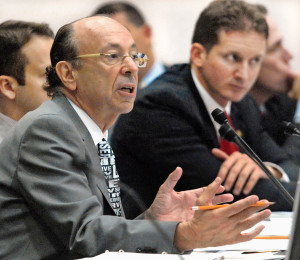source: myfloridahouse.gov
Rep. Irv Slosberg has proposed laws banning texting and driving
By Steve Miller
Florida has landed on the “Worst States” list for lax highway safety laws by a national consumer group, although the mileage death rate – the number of fatalities per 100 million miles traveled – has dropped three-quarters of a percentage point in the last decade.
The list ranking the 50 states for driver safety laws from Advocates for Highway and Auto Safety, a Beltway group founded in 1989, reports Florida laws are among the most lax in the nation. Florida was the group’s choice for seventh worst state, out of 11, when it came to driver safety laws. South Dakota came in dead last.
Florida is “missing rear primary enforcement seat belt law, all-rider motorcycle helmet law, booster seat law, 4 of the 7 teen driving provisions, an ignition interlock law, and an all-driver text messaging restriction,” according to the report.
“Florida is one of weakest in the country in terms of traffic safety laws,” said Cathy Chase, vice president of governmental affairs for the Advocates group. “This year it dropped even lower in our ranks but overall it has always been a problem. It was one of the first states to repeal its motorcycle helmet law, has no rear seat belt law and overall just lacks the leadership to get safety laws passed.”
It’s the texting issue that has Florida trailing a number of other states, Chase said. A state ban on driving and texting went into effect last fall, but the law was crafted in a way that made the offense a secondary infraction under which a driver cannot be pulled over just for texting but can be cited when being detained for another infraction.
“A secondary texting law is toothless,” Chase said.
The texting ban was one of two bills addressing the issue introduced in last year’s legislative session, including one that allowed law enforcement to pull over a texting driver, which never made it out of committee.
Three bills that would beef up the state’s texting and driving law are currently active in the statehouse, including two filed last week by state Rep. Irv Slosberg, a Democrat from Delray Beach. His HB 645 would prohibit drivers in school zones from using a cell phone, including for use in texting or emailing, while HB 539 would revise the existing law regarding texting and allow police to stop a vehicle solely upon the observation of a driver texting.
Slosberg was an entrepreneur when his daughter, Dori, was killed in a traffic accident in 1996. He became a state lawmaker in 2002, and over the years has introduced a number of measures regarding traffic safety.
The newest bills take on a powerful source of opposition, Slosberg said.
“There are a number reasons people in Tallahassee oppose bills,” he said. “One of them is that people don’t want to stop something they do.”
Texting is a pervasive practice despite its obvious dangers, and Slosberg said given the potential for disaster it presents, he expects his colleagues will see both of his bills through.
“Last year’s bill, I was just happy to see something on the books,” Slosberg said.The concern over texting while driving accidents, is similar to how the outcry over talking on a cell phone prompted calls for cell phone ban use in cars.
The concern over texting while driving accidents is similar to how the outcry over talking on a cell phone prompted calls for cell phone use bans in cars.
Today, 12 states and the District of Columbia prohibit chatting on a cell while driving. Thirty-seven states have a primary law against texting, similar to Slosberg’s proposed measure, while four, including Florida, have secondary laws.
The Florida Department of Highway Safety and Motor Vehicles in a report released in October found the state’s traffic fatality rate dropped significantly in the past few years after rising in the early 2000s. In 2012, there were 2,430 traffic deaths, compared to 3,533 in 2005.
The drop in fatalities is connected to the primary-secondary notion of traffic policing, noted Slosberg.
“They dropped starting in 2005 when not wearing a seatbelt became a primary reason to get pulled over for minors,” Slosberg said. “They kept going down and in 2009, the primary seat belt law went into effect for everyone.”

